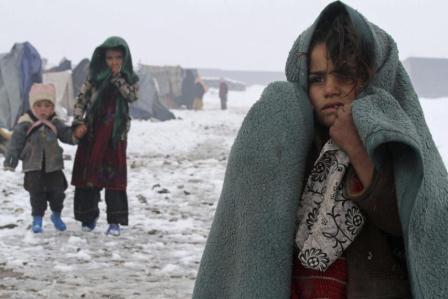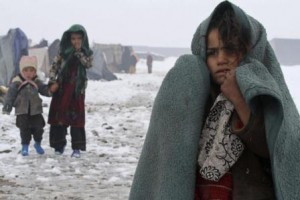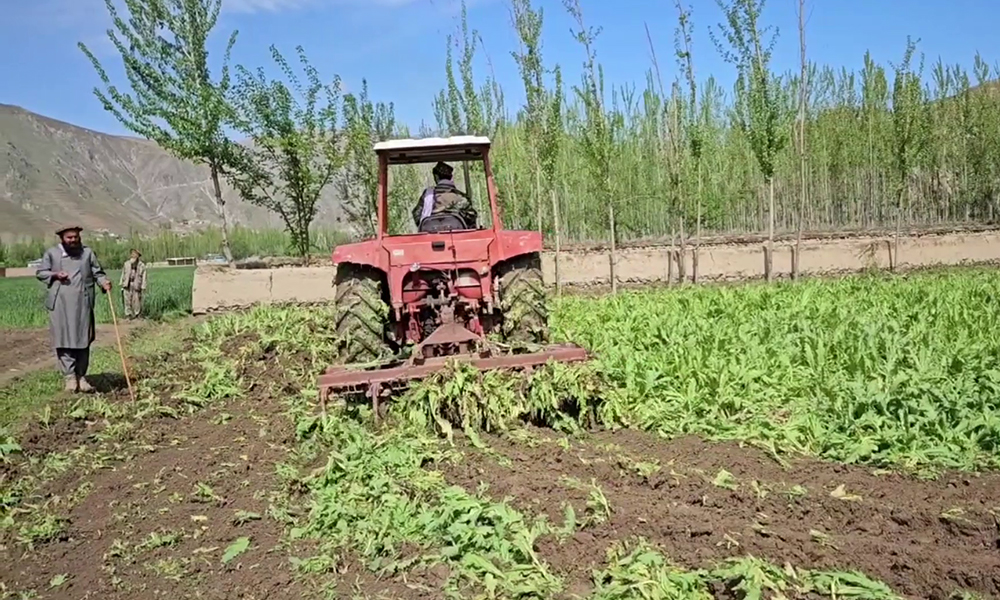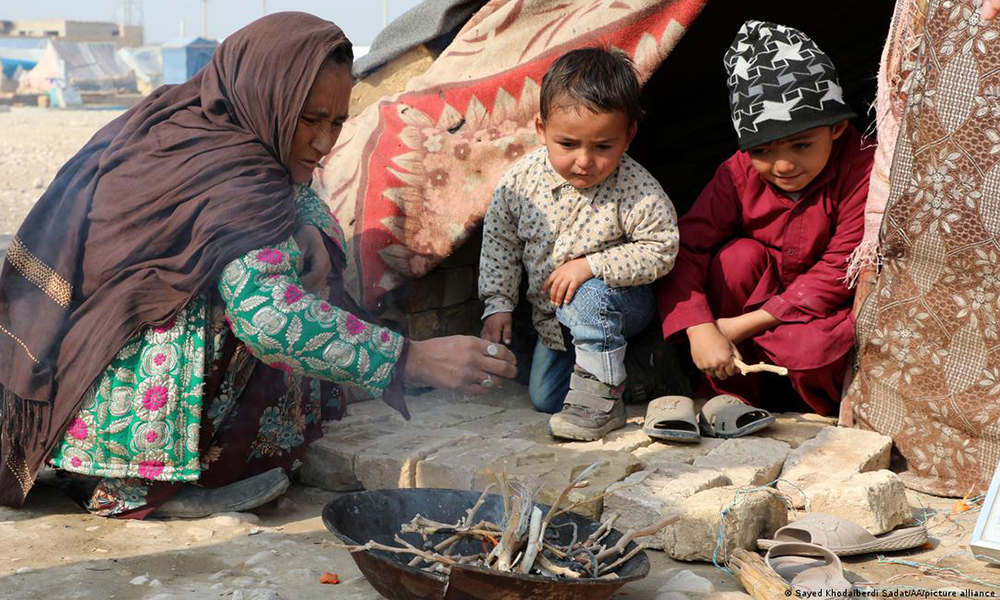Latest News
UN: 6.3 Million Afghans in Need of Humanitarian Aids

 UN and the Organization of Islamic Cooperation (OIC) in World Humanitarian Day in Kabul on Saturday said that the civilians continued to bear the brunt of a conflict that has grown in intensity and geographic scope, affecting the lives of at least 6.3 million Afghans.
UN and the Organization of Islamic Cooperation (OIC) in World Humanitarian Day in Kabul on Saturday said that the civilians continued to bear the brunt of a conflict that has grown in intensity and geographic scope, affecting the lives of at least 6.3 million Afghans.
Over 210,000 people have been newly internally displaced by conflict in 2016 alone – some 1,000 people per day.
Commemorating the World Humanitarian Day in Kabul, UN high-level officials have urged for the increased international partnerships to address the root causes of humanitarian needs, reduce communities’ vulnerability to disasters and raise awareness of Afghanistan’s protracted humanitarian crisis.
UN Assistant Secretary-General for Humanitarian Partnerships with the Middle East and Central Asia Rashid Khalikov said: “Nearly a third of the people of Afghanistan are in need of humanitarian aid and this continues year after year. It is critical that the UN works to reinforce the humanitarian partnerships that can support and enhance the response to people’s immediate and longer term needs.”
UN Assistant Secretary-General for Humanitarian Partnerships with the Middle East and Central Asia Rashid Khalikov said: “Nearly a third of the people of Afghanistan are in need of humanitarian aid and this continues year after year. It is critical that the UN works to reinforce the humanitarian partnerships that can support and enhance the response to people’s immediate and longer term needs.”
A 2016 mid-year UN report recorded a total number of 5,166 civilian casualties, the largest since 2009. One third of the casualties were children. The total number of civilian casualties since 2009 amounts to 63,934.
Ambassador Hesham Youssef, assistant secretary-general of OIC for humanitarian affairs, said: “It is evident to us that much more effort is needed to address the deteriorating situation in Afghanistan. This is why the OIC is exerting extensive efforts to address the escalating conflict.
“We also hope to be able to benefit from this mission in raising awareness of the humanitarian situation in Afghanistan at the international level and in our Member States with the objective of increasing their assistance and investment in sustainable development solutions for the people of Afghanistan.”
Chairman of OIC Humanitarian Funds’ Board of Trustees Sheikh Abdul Aziz al-Thani said: “With this visit marking World Humanitarian Day, and as needs continue to grow, we are looking into how the OIC Humanitarian Fund for Afghanistan can build on 15 years of presence to mobilise greater and more predictable funding for humanitarian programmes.”
UN’s Deputy Special Representative of Secretary-General Resident and Humanitarian Coordinator Mark Bowden said: “Afghanistan remains as one of the world’s most protracted crises that has led to massive levels of internal displacement.
“Each year sees more families uprooted by conflict many of whom remain displaced and at the margins of survival. In this, the first World Humanitarian day following the World Humanitarian Summit, we must make more determined efforts to live up to international commitments made in Istanbul to leave no one behind and better address the needs of displaced people…”
In the meantime, Ministry of Refugees and Repatriation said nearly 170,000 Afghans have been displaced in various parts of the country and the world since the beginning of the current year.
“The number of displaced due to war have been increased and this figure has spiked compared to the previous year. We are trying to send them aids,” said Mia Khail, deputy of Ministry of Refugees and Repatriation.
The continued conflict and displacement create recurring humanitarian emergencies which place further strain on already overstretched and insufficient basic services.
Afghanistan has the world’s second highest mortality rate for children under five and almost 3 million people are affected by malnutrition.
The deteriorating security situation severely hampers the delivery of health services and the displaced people are highly vulnerable to both diseases and malnutrition.
In addition, natural disasters such as floods, earthquakes, landslides and droughts impact on an estimated 235,000 people every year.
The current humanitarian situation is already severe and needs are increasing. The 2016 Humanitarian Response Plan, aiming to help 3.5 million people in need, is tightly focused on the most acute life-saving response to displaced people and on life-saving interventions in health and nutrition.
As of 30 June, 61 per cent – US$207 million – of the $339 million mid-year revised request have been received.
Every effort must be made to increase current levels of international humanitarian aid and at the same time invest in long-term, sustainable development solutions to address the recurrent humanitarian needs and strengthen community resilience.

Latest News
Over 6,000 acres of land cleared of poppies in Badakhshan

Badakhshan Police Command says it has cleared more than 6,000 acres of poppy fields in northern Badakhshan province.
The anti-narcotics department of Badakhshan Police Command says that since the beginning of the campaign to destroy the poppy fields in this province, they have cleared more than 6,000 acres of land.
According to these officials, poppies have however been planted in more than 10 districts this year.
The anti-narcotics department of the Badakhshan Police Command says that the campaign to destroy the poppy plantations started two months ago and continues.
According to the officials, during this period, 6,300 acres of land has been cleared.
Some of the farmers whose fields were destroyed say that poppy is more profitable than other agricultural products, but now that their land has been cleared, they want alternative crops.
According to the officials, Kishim, Argo, Darayimand and Jurm districts are among the districts where poppies are cultivated.
Latest News
MSF ‘deeply concerned’ over new phase of deportations of Afghans from Pakistan

Médecins Sans Frontières (MSF) said Wednesday it was deeply concerned for the rights and welfare of Afghan refugees in Pakistan in the wake of the recent announcement by Islamabad that it plans to start Phase Two of the deportation campaign.
Pakistan is home to an estimated 3.7 million Afghans, and a reported 500,000 have crossed the border so far.
Many Afghans living in Pakistan have been there for decades and have spent more time in the country than their country of origin, without any legal recourse to remain in the only place they can effectively call “home”.
For many Afghans, Islamabad’s “repatriation” campaign means packing up their belongings and carrying them on a horse, cart, car and bus and traveling en masse to a country that is already struggling with widespread poverty, inadequate health services and increased restrictions on women, MSF said in a statement.
The second phase of the deportations leaves an estimated 800,000 Pakistan-issued Afghan Citizen Card (ACC) holders vulnerable to return, while phase three is expected to result in the further deportation of UNHCR-issued Proof of Registration (PoR) card holders, MSF said.
MSF first started working in Pakistan in 1986, and today provides much-needed medical care to people in Balochistan, Khyber Pakhtunkhwa and Sindh provinces.
The Islamic Emirate of Afghanistan (IEA) and UN agencies estimate that more than half a million people have been deported from Pakistan or voluntarily returned to Afghanistan in the past six months.
The United Nations High Commissioner for Refugees said last month that nearly two million Afghan refugees are living in Pakistan and that the agency needs $368 million this year to assist these people.
Latest News
2023 marred by ‘tremendous challenges’ for Afghanistan

Last year, 2023, was a year of “tremendous challenges” for the people of Afghanistan, but it was also a year marked by resilience and determination, the Deputy Special Representative of the Secretary-General, Resident and Humanitarian Coordinator, Indrika Ratwatte, said in the UN’s annual report on Afghanistan that was published this week.
Ratwatte said: “In the face of adversity and multiple concurrent shocks, the people of Afghanistan have demonstrated remarkable courage and strength.”
Afghans now mention access to food as their most pressing need, he said adding that “unable to pay for or produce basic sustenance, millions face hunger and malnutrition.”
In 2024, an estimated 15.8 million people will experience crisis and emergency levels of food insecurity.
The majority of the population is unable to procure basic needs such as healthcare, food, livelihoods, and housing, the report stated.
The UN found that the country also remains vulnerable to climate change.
Following the worst drought in three decades, emerging El Niño conditions now threaten a new cycle of flooding and crop pests. In this context, lifesaving humanitarian aid has been crucial in preventing the collapse of the social fabric. It has also served to underpin the stability of the economy. Despite growing humanitarian needs, relevant funding cuts have forced humanitarian actors to prioritize the most vulnerable further, the report stated.
A Gallup poll found that 95 percent of the population consider themselves to be suffering. In addition to living in poverty, the average life expectancy in Afghanistan has been falling for the past five years.
The Herat earthquakes and unprecedented large-scale returns of refugees from neighbouring countries, including Pakistan and Iran, have shown the disruptive impact of recurrent shocks and underscored the need for sustained international engagement and support, the UN stated.
“As we embark on the next chapter, in 2024, it is imperative that we remain steadfast in our commitment to the principles of human rights, gender equality, and women’s Empowerment,” Ratwatte said.
“We will continue to include women as key partners in our work, to provide assistance ‘by women, for women’, and to tirelessly work for equal access to education in line with the demands we hear from Afghans in all areas of the country,” he said.
However, from an economic point of view, Afghanistan’s economy appears to be stabilizing at a low equilibrium level following a period of significant contraction since 2021.
The UN said in the report that growth barriers include severely restricted operations in the banking sector (including microfinance institutions), trade disruptions, and institutional issues hindering service delivery, including in the private sector.
“The sudden cessation of a significant amount of international aid and grants, which had accounted for 40 percent of the country’s Gross Domestic Product (GDP), along with a freeze on international reserves amounting to about US$9 billion and the imposition of international sanctions, caused a severe balance of payments, banking and payment systems crisis.
“Notably, financial restrictions have removed liquidity from the banking system,” the report stated.
Despite the crisis and a period of devaluation towards the end of the year, the AFN is 20 percent stronger than it was in 2021 due to currency export controls, UN cash shipments of US dollars into Afghanistan, and personalremittances.
Imports continued to surpass exports through 2023 and increased as the economy contracted.
“This appears to be a paradox: the currency appreciated while the trade deficit widened, suggesting that there might be other unidentified sources of financing besides US dollar cash shipments and remittances to support the account deficits,” the report read.
The UN also said that with its partners, it will work to initiate a dialogue with the Islamic Emirate on adjustments to regulatory frameworks and sustained public service delivery with the aim of creating a long-term and sustainable pathway to reduce aid dependency and put Afghanistan back on a path towards development
“In this regard, we reiterate our offer to the DFA for a dialogue and will work jointly with international partners, donors, and Afghans on how such engagement can be structured in a most productive way.”
-

 Sport5 days ago
Sport5 days agoACL draw to be broadcast live on ATN channels
-

 Regional5 days ago
Regional5 days agoIRGC chief warns of harsher response if Israel attacks Iran
-

 Sport4 days ago
Sport4 days agoACL fever grows as fixtures finalized
-

 World4 days ago
World4 days agoUS will not take part in any Israeli retaliatory action against Iran
-

 Latest News4 days ago
Latest News4 days agoOver 50 people dead in traffic accidents over Eid
-

 Latest News4 days ago
Latest News4 days agoUS identifies Kabul airport suicide bomber
-

 Business4 days ago
Business4 days agoAfghanistan-Kazakhstan chamber of commerce opens in Herat
-

 Latest News4 days ago
Latest News4 days agoGood rains enable DABS to increase power production in Kabul















